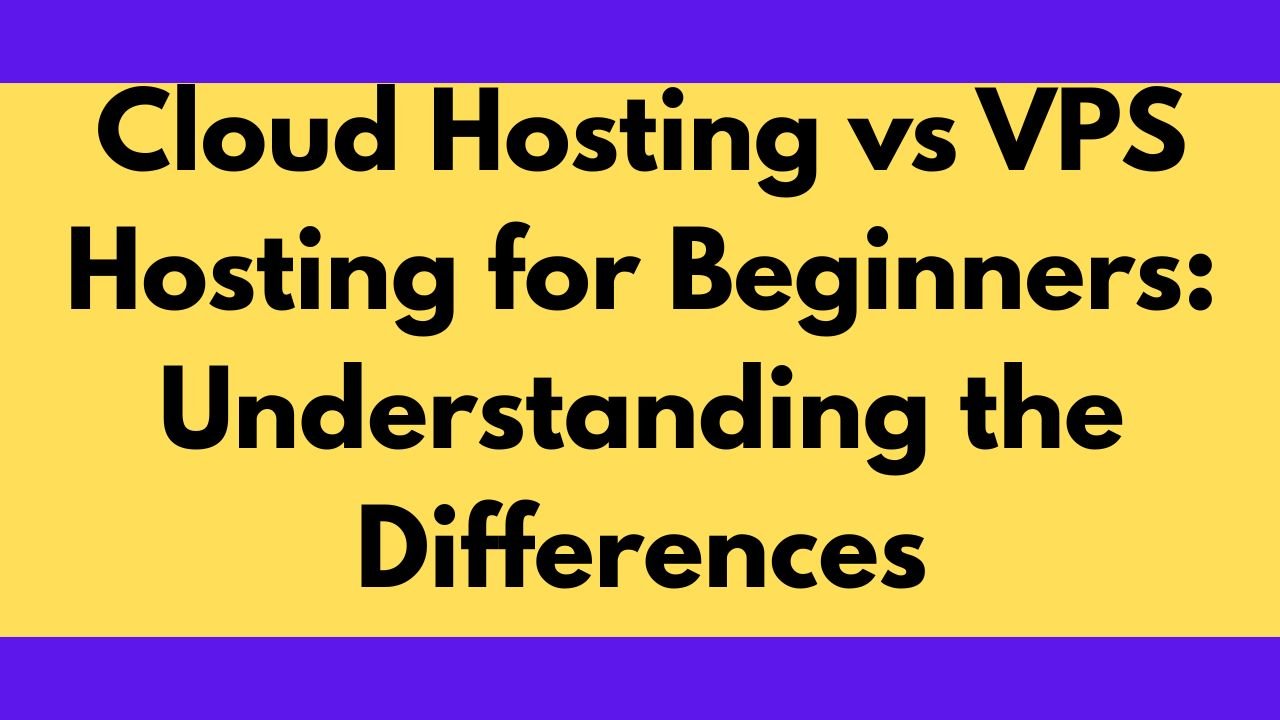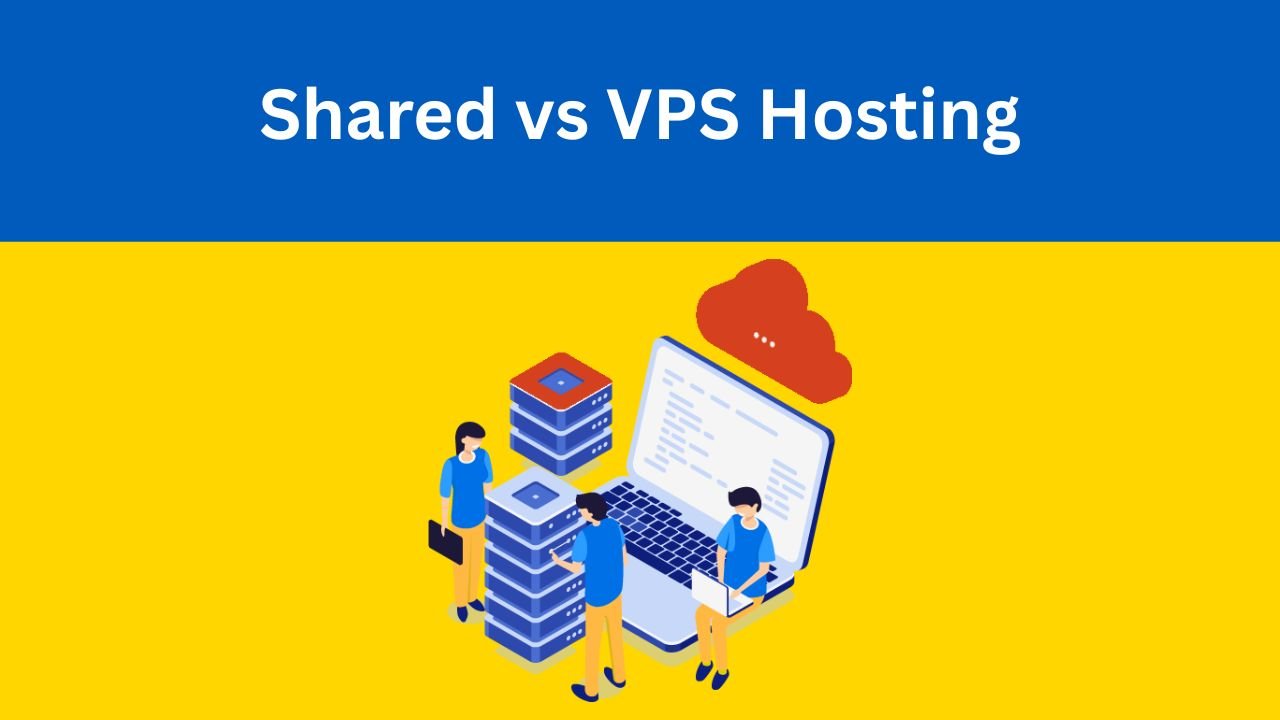Introduction to Hosting Options
Cloud Hosting vs VPS Hosting: Web hosting is a service that allows individuals and organizations to make their websites accessible via the internet. The primary role of a web host is to provide the necessary infrastructure to store website data, including files, images, and databases, which can then be accessed by users through their web browsers. For beginners, selecting the right type of hosting is a foundational step that can significantly impact their online presence and overall experience in managing a website.
There are various hosting solutions available, but two popular choices among novices are cloud hosting and VPS (Virtual Private Server) hosting. Understanding the differences between these two options is essential for making an informed decision that aligns with one’s needs and expectations. Cloud hosting leverages a network of interconnected servers to provide resources on demand. This flexibility ensures that websites can handle varying traffic levels without downtime. On the other hand, VPS hosting offers a dedicated portion of a physical server, which provides users with more control, increased performance, and higher reliability than shared hosting.
For beginners, key factors to consider when selecting hosting options include budget, scalability, and technical expertise. Cloud hosting is often favored because it allows for easy scaling as a website grows, making it suitable for users who anticipate fluctuating traffic or demand. Conversely, VPS hosting can be an ideal choice for those seeking more control over their hosting environment and who are willing to invest time in managing it. Beginners should assess their specific requirements, such as budget constraints and desired levels of technical involvement, to determine which hosting solution best suits their current and future needs.
What is Cloud Hosting?
Cloud hosting is a type of web hosting that utilizes a network of interconnected servers to host websites and applications. Unlike traditional hosting services, which typically rely on a single server, cloud hosting takes advantage of multiple servers working together, thereby ensuring a more flexible and robust solution. This architecture allows users to access shared resources across several locations, which enhances both reliability and performance. It operates on a cloud computing model, where virtualized resources can be allocated and adjusted as needed.

One of the most significant benefits of cloud hosting is its scalability. Users can easily increase or decrease their resource allocation based on current demands without experiencing any downtime. This is particularly advantageous for beginners or small businesses experiencing fluctuating traffic. Rather than overcommitting to a specific amount of resources, users can pay for what they actually utilize at any given time, making cloud hosting a cost-effective solution.
Moreover, cloud hosting provides enhanced reliability through redundancy. If one server fails, the system can automatically reroute traffic to another server in the network, minimizing the risk of downtime and ensuring that the website remains accessible. This redundancy is particularly beneficial for those new to web hosting, alleviating concerns about potential service interruptions.
Resource distribution is another crucial aspect of cloud hosting. The infrastructure allows multiple users to benefit from a pooled set of resources, such as storage and processing power, which reduces the likelihood of performance degradation during peak usage times. As websites grow, this feature enables owners to manage their resources efficiently without having to constantly upgrade their individual servers.
What is VPS Hosting?
A Virtual Private Server (VPS) hosting is a type of internet hosting that utilizes virtualization technology to subdivide a single physical server into multiple virtual servers. Each of these virtual servers operates independently and is equipped with its own operating system, dedicated resources, and customizable configurations. This architecture provides users with more control and flexibility compared to shared hosting environments, where resources are shared among multiple users.

In a VPS setup, each virtual server behaves like a dedicated server, meaning that users do not have to worry about the performance impact caused by other tenants on the same physical machine. This isolation ensures that resources such as CPU, RAM, and storage are reserved for individual users, allowing for enhanced performance and stability. The ability to allocate specific resources to a VPS is one of the primary reasons why this hosting solution is popular among businesses and developers who require reliable and scalable environments.
One of the key advantages of VPS hosting is the level of customization it offers. Since users have root access to their virtual servers, they can install and configure software as they see fit, tailoring the environment to meet specific needs. This feature is particularly appealing to web developers, application creators, and businesses that require unique configurations or security settings. Moreover, VPS hosting can accommodate growth; as demand increases, users can easily upgrade their resources, ensuring that they can manage traffic spikes without compromising performance.
Overall, VPS hosting provides a balanced approach for users seeking dedicated resources combined with the flexibility to modify server settings. Its increasing popularity is a testament to the growing need for more control in hosting environments, making VPS an attractive choice for various users ranging from individual entrepreneurs to larger organizations.
Key Differences Between Cloud Hosting and VPS Hosting
When evaluating cloud hosting and VPS (Virtual Private Server) hosting, it is essential to understand the critical differences that can impact performance, cost, scalability, and structure. This comprehension is particularly beneficial for beginners who seek to choose the right hosting solution for their websites.
Firstly, in terms of structure, cloud hosting utilizes a network of servers to distribute resources, which allows for a more resilient system. If one server experiences issues, another server can take over, ensuring uptime and reliability. Conversely, VPS hosting is rooted in a single server that is divided into multiple virtual compartments. Each user has dedicated resources, but any failure of the main server can lead to downtime for all tenants on it.
Performance is another significant aspect to consider. Cloud hosting typically provides superior performance, especially during traffic spikes, as resources can be pulled from multiple servers seamlessly. In contrast, VPS hosting may face limitations during high-traffic periods since it relies on fixed resources assigned to that virtual server environment.
Cost also varies between the two options. Cloud hosting often employs a pay-as-you-go model, allowing users to pay only for the resources they utilize. This flexibility can be advantageous for businesses with fluctuating traffic. VPS hosting, however, usually involves a fixed monthly cost, which may lead to overpayment if resource requirements are not fully utilized.
Lastly, scalability is a crucial differentiator. Cloud hosting is generally more scalable, permitting users to easily upgrade or downgrade resources in real-time as their needs evolve. On the other hand, VPS hosting offers limited scalability, which may necessitate migration to a larger server as a website grows.
A comparison table can clarify these distinctions further, illustrating how each hosting type aligns with specific website requirements and growth expectations. Through understanding these key differences, beginners can make informed decisions regarding their hosting services, ultimately ensuring optimal website performance and management.
Cost Analysis: Cloud Hosting vs VPS Hosting
When considering hosting solutions, cost is often a key factor for beginners. Both cloud hosting and VPS (Virtual Private Server) hosting offer distinct pricing models that cater to varying needs. Understanding these models is essential for making informed financial decisions.
Cloud hosting typically operates on a pay-as-you-go basis. This means that users are billed for the resources they utilize, with pricing fluctuating based on traffic levels and resource consumption. This flexibility can be advantageous for websites that experience variable traffic, as it allows them to scale their resources up or down without incurring significant pre-commitment costs. For instance, a startup may start with minimal resources and incrementally expand as user demand grows, which can help manage budgets effectively.
Conversely, VPS hosting generally involves a fixed monthly fee, which provides a more predictable budgeting option. Users purchase a dedicated slice of a physical server’s resources, thus having set limits on CPU, RAM, and bandwidth. While VPS hosting may have higher upfront costs than the basic tiers of cloud hosting, it offers stable performance suited for websites with steady traffic. However, beginners should be aware of potential additional expenses, such as tech support or managed services, which can escalate the total cost.
Both hosting types may also encompass hidden costs related to data transfer, backup solutions, or software licenses. It is crucial to carefully evaluate the specific offerings of various hosting providers, as these can significantly influence the overall budget. By analyzing the pricing structures and any supplementary fees, individuals can select the most cost-effective solution tailored to their needs.
Performance and Reliability Measurements
When evaluating hosting solutions, understanding performance metrics such as uptime and load speeds is crucial, especially for beginners seeking to maintain an accessible and efficient website. Cloud hosting and VPS (Virtual Private Server) hosting each offer unique advantages regarding performance and reliability, helping users choose the best fit for their specific needs.
Cloud hosting is renowned for its scalability and flexibility. It employs a network of interconnected servers, which can distribute workloads efficiently. This design ensures that resources can be allocated dynamically based on traffic demands. Consequently, during high traffic periods or unexpected surges, cloud hosting can maintain optimal performance by drawing upon additional resources from the cloud environment. The result is often enhanced uptime and faster load speeds, providing a seamless experience for users visiting the site.
On the other hand, VPS hosting features a single physical server that is divided into multiple virtual servers. Each virtual server operates independently, which can contribute positively to performance. VPS hosting offers dedicated resources, ensuring that even during high traffic events, performance remains consistent. However, it might not handle fluctuations as effectively as cloud hosting since it is limited by the resources of the single physical server. Uptime for VPS hosting tends to be high, but it can be affected by factors like hardware failures or server maintenance.
In terms of reliability, both cloud and VPS hosting solutions boast strong uptime records. Nonetheless, cloud hosting generally has a slight edge due to its redundant nature—if one server fails, traffic can automatically reroute to another server in the network, minimizing downtime. In summary, when choosing between cloud hosting and VPS hosting, it is essential to consider how these solutions can meet your performance needs, particularly regarding uptime and load management under varying traffic conditions.
Technical Skills Required for Each Hosting Type
When it comes to choosing between cloud hosting and VPS (Virtual Private Server) hosting, understanding the technical skills required for each option is crucial, especially for beginners. Cloud hosting typically involves a network of servers that offer resources on demand, while VPS hosting simulates a dedicated server environment within a shared server framework. Each of these hosting types has varying levels of complexity regarding management and configuration.
Cloud hosting tends to be more user-friendly for beginners. Many cloud service providers offer managed services that minimize the need for technical expertise. Users can easily scale their resources and manage settings through intuitive control panels. Additionally, the infrastructure is maintained by the service provider, which means that tasks such as system updates and security patches are automated, eliminating a significant burden on the user. This makes cloud hosting an ideal choice for those with limited technical skills.
On the other hand, VPS hosting requires a more in-depth understanding of server management. Users typically have root access, which grants them the ability to configure and customize server settings according to their needs. This freedom comes with the responsibility of managing system updates, security configurations, and performance monitoring. As a result, beginners might find VPS hosting challenging unless they possess some prior experience with server administration. Technical skills such as familiarity with command-line interfaces, operating systems, and networking are valuable when engaging in VPS hosting.
In conclusion, while cloud hosting offers a more beginner-friendly approach with less technical maintenance required, VPS hosting demands a greater level of technical expertise and management skills. As such, beginners should carefully assess their comfort level with technology before making a decision on which hosting option to pursue.
Ideal Use Cases for Cloud Hosting and VPS Hosting
When selecting between cloud hosting and VPS hosting, understanding the specific use cases for each can significantly influence the decision-making process for businesses and individuals alike. Cloud hosting is particularly suitable for organizations that experience fluctuating traffic patterns, as it offers scalability to accommodate varying demands. For instance, e-commerce platforms during holiday sales or promotional events may experience spikes in traffic. In such cases, cloud hosting can seamlessly allocate resources to manage increased demand without compromising performance.
Another ideal use case for cloud hosting includes collaborative projects, where multiple users need access to the same files and applications in real-time. For example, a remote development team working on a software application benefits from cloud hosting’s virtualization capabilities, allowing for shared resources and easier collaboration. Similarly, startups and small businesses with unpredictable growth often find cloud hosting to be a more cost-effective option, as they can only pay for the resources used, enhancing budget management and reducing upfront costs.
On the other hand, VPS hosting is an excellent choice for businesses seeking greater control and customization over their hosting environment. For example, organizations running specific applications that require consistent performance and resource allocation may prefer a VPS hosting solution. A web application with predictable traffic would thrive within the confines of a VPS, benefiting from dedicated resources while still being cost-effective. Additionally, companies with strict compliance requirements may choose VPS hosting, as it allows for a more tailored security configuration to meet specific regulatory standards.
Understanding these ideal use cases can aid businesses in making informed decisions based on their unique needs and long-term goals. By considering the scalability of cloud hosting compared to the control offered by VPS hosting, businesses can select the most appropriate solution for their operational requirements.
Conclusion: Which Hosting Should You Choose?
Selecting the appropriate hosting type between cloud hosting and Virtual Private Server (VPS) hosting can significantly impact your website’s performance, scalability, and overall user experience. Throughout this article, we have discussed the key differences between these two hosting options, emphasizing their unique features, advantages, and potential drawbacks. Both cloud and VPS hosting are designed to cater to specific needs, making it essential for users to evaluate their requirements thoroughly before making a decision.
Cloud hosting excels in its flexibility and scalability, accommodating businesses experiencing fluctuating traffic levels. If your website requires immediate resource allocation to handle traffic surges effectively, cloud hosting might be the ideal fit. This hosting solution also typically provides enhanced redundancy, reducing downtime risks and improving overall reliability.
On the other hand, VPS hosting offers users a dedicated environment while still maintaining cost efficiency, which can be a compelling choice for small to medium-sized businesses. With more control over the server configuration, users can customize their hosting environment to optimize performance for specific applications or services. However, this might require a bit more technical expertise compared to cloud hosting.
Ultimately, the choice between cloud hosting and VPS hosting depends on your unique needs and long-term goals. If you anticipate significant growth or variations in demand, cloud hosting may provide you with the necessary scalability and flexibility. Conversely, if you prefer a stable environment with dedicated resources at a lower cost, VPS hosting might align better with your objectives. Assessing your current requirements and future growth potential will guide you in selecting the most suitable hosting option for your online presence.
🚀 Unlimited Lifetime Web Hosting – Pay Once, Host Forever!
Never Pay Hosting Fees Again! Secure blazing-fast, reliable web hosting with a one-time payment – no renewals, no hidden costs!
- ✅ Unlimited Storage & Bandwidth
- ✅ Free SSL Certificate
- ✅ Host Unlimited Websites
- ✅ 99.9% Uptime Guarantee
- ✅ Free cPanel/DirectAdmin Access
- ✅ One-Time Price – Starting @ ₹999
Perfect for: Bloggers | Businesses | Freelancers | Developers
🔒 100% Secure | 💡 24/7 Support | 🌍 Global Server Access
💥 Grab This Lifetime Deal Now!




